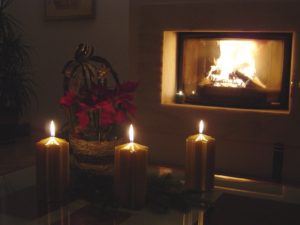 This morning I sat at my word processor, and looked out of my office window over the barren branches of a Post-Thanksgiving landscape. The Andrew Wyeth bleakness caused me to clutch my warm cup of coffee with both hands. Suddenly, I could feel a cardigan-clad part of my inner-self escorting me back to an earlier time in my life.
This morning I sat at my word processor, and looked out of my office window over the barren branches of a Post-Thanksgiving landscape. The Andrew Wyeth bleakness caused me to clutch my warm cup of coffee with both hands. Suddenly, I could feel a cardigan-clad part of my inner-self escorting me back to an earlier time in my life.
In my childhood, our family’s rural ranch house looked out on winter views of completely flat, snow-covered cornfields to the north. Snow would fall in November, covering the dried stalks and husks that the tractor failed to pluck from the black Midwestern loam. In those days, temperatures would rarely rise above freezing until the following March. The strata of accumulated drifting snow would often submerge the barbed wire and split wood stakes that fenced off fields. If it weren’t for the snowy-roofed barns, silos, and farmhouses in the distance, one could imagine that a multiple acre section of the Arctic had somehow broken loose and migrated to Will Ludwig’s fields across the street.
A few stone’s throws behind our house, Lake Springfield was hemmed in on its northern boundary by our backyard. From there, the lake stretched three quarters of a mile south until it met a nature preserve that had recently been stripped of its autumn foliage. To the east and west, the undulating shoreline was held in place by jagged rock put in place to protect property owners’ soil from the damaging effects of three seasons of waves and one season of ice. Like the farmer’s fields to the north, the lake’s muddy water would be submerged under ever-thickening snow and ice until the following spring.
My citified, nervous mother saw to it that we were the last kids skating on the lake in the winter, and the first kids off of it in the spring. No child was going to fall through the ice on her watch. I wasn’t much of an ice-skater to start with, but soon I was to discover that skating on wind-swept, hand-shoveled lake-ice is a lot like roller-skating over the top of a huge washboard. Whenever somebody said, “Let’s go skating!” I always replied with an enthusiastic, “Yes!” because I figured that it was the expected kid thing to do. But in my heart-of-hearts, ice skating did not represent fun for me. Ice skating represented bruised knees, sore, bent ankles, and ice-cold feet. In truth, the only thing I really liked about our ice-skating adventures was my mom’s post-skating, milk-based, hot chocolate enjoyed from the comfort of our heated living room—sometimes over a game of chess.
As I peruse this old post-card from my past, I am aware that the season of Advent, situated as it is at the beginning of the winter, has a way of awakening the home-movie-watching, nostalgia-loving, cardigan-clad, old man or woman in all of us. Snow covered pine trees, and crackling, popping fires have a way of taking a person back to the happy ghosts of Christmases and winters past.
It seems to me that nostalgia, like hot chocolate, is good when taken in measured doses. If you take in just enough, it can act as a sweetener in one’s life. If you drink in too much, it can slow you down, and even make you feel sick.
In this week’s Gospel (Luke 3:1-6), the Evangelist showed us the proper approach to a life-giving relationship with the past. In the third reading, the author of Luke took the reader down memory lane to situate our salvation story in concrete history. By calling up the names of the governmental leaders and geographic locations of the time, Luke was placing the hard edges of objective, historical reality around the narrative. By capturing the particular piece of John the Baptist’s exhortation from the Book of Isaiah, Luke was surfacing an important part of Israel’s shared memory. Taking this tour through a shared past was aimed at setting the stage for an encounter with the living Word of God here in our shared present.
It seems to me that this is the key in determining if our relationship with the past is helpful or harmful. It can be summed up in a single question. “Does my engagement with the past lead to an enhanced celebration and enjoyment of the present? Or does my engagement with the past cause me to get stuck in it by missing the opportunities for grace in this time zone?” For example, how often do you catch yourself denigrating this time, and this place because it never seems to match up to the splendor of the happier days of yore?
The God of Abraham and Sarah, Isaac and Rebecca, Jacob and Rachel, Zechariah and Elizabeth, Mary and Joseph, is not only the God of a glorious history. The God of Jesus Christ is the living God of the present who is just now reaching out to give you a gift in this moment. Are you present enough to be touched by the God who is here and now in these circumstances and in this time zone of your life?
